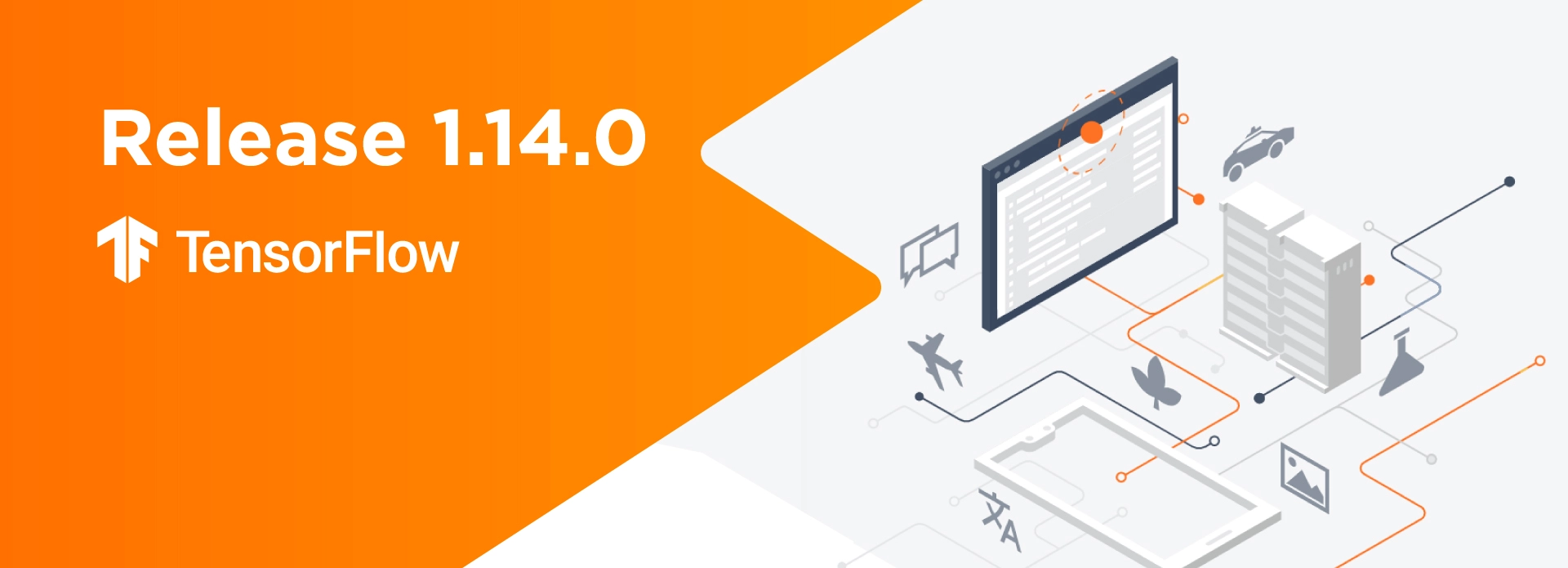Deep Learning
New TensorFlow Release v1.14.0
June 20, 2019
11 min read

Here is an overview of TensorFlow’s latest release 1.14.0.
libtensorflow_framework.so.1libtensorflow_framework.1.dyliblibtensorflow tarball archives contain the libtensorflow library and two symlinks. MacOS .dylib libraries are the same, but match MacOS library naming requirements (i.e. libtensorflow.1.dylib):libtensorflow.so.1.14.0, the main librarylibtensorflow.so.1, symlinked to the main librarylibtensorflow.so, symlinked to .so.1AUTO for improving reliability of loss scaling with distribution strategy and custom training loops. AUTO indicates that the reduction option will be determined by the usage context. For almost all cases this defaults to SUM_OVER_BATCH_SIZE. When used in distribution strategy scope, outside of built-in training loops such as tf.keras compile and fit, we expect reduction value to be 'None' or 'SUM'. Using other values will raise an error.compile API (strings and v1 losses) which are not instances of v2 Loss class in LossWrapper class. => All losses will now use SUM_OVER_BATCH_SIZE reduction as default.run_eagerly and distribution strategy if there are symbolic tensors added to the model using add_metric or add_loss.map_vectorization optimization, reduce the degree of parallelism in the vectorized map node.TF_CUDA_HOST_MEM_LIMIT_IN_MB has been changed to TF_GPU_HOST_MEM_LIMIT_IN_MB.norm_axis and params_axis with axis.clear_losses API to be able to clear losses at the end of forward pass in a custom training loop in eager.metrics param in Keras compile.cumsum and cumprod keras backend functions.dynamic constructor argument in Layer and Model, which should be set to True when using imperative control flow in the call method.add_metric in the graph function mode.add_update can now be passed a zero-arg callable in order to support turning off the update when setting trainable=False on a Layer of a Model compiled with run_eagerly=True.weighted prefix from weighted metric names.defun, providing an escape hatch to continue using the legacy Defun.tensorflow_core and tensorflow is just a virtual pip package. No code changes are needed for projects using TensorFlow, the change is transparenttf.compat.v1.estimator.inputs instead of tf.estimator.inputscontrib references with tf.estimator.experimental.* for APIs in early_stopping.py--iterations_per_loop for TPUEstimator or DistributionStrategy continues to be a challenge for our users. We propose dynamically tuning the --iterations_per_loop variable, specifically for using TPUEstimator in training mode, based on a user target TPU execution time. Users might specify a value such as: --iterations_per_loop=300s, which will result in roughly 300 seconds being spent on the TPU between host side operations.
Here is an overview of TensorFlow’s latest release 1.14.0.
libtensorflow_framework.so.1libtensorflow_framework.1.dyliblibtensorflow tarball archives contain the libtensorflow library and two symlinks. MacOS .dylib libraries are the same, but match MacOS library naming requirements (i.e. libtensorflow.1.dylib):libtensorflow.so.1.14.0, the main librarylibtensorflow.so.1, symlinked to the main librarylibtensorflow.so, symlinked to .so.1AUTO for improving reliability of loss scaling with distribution strategy and custom training loops. AUTO indicates that the reduction option will be determined by the usage context. For almost all cases this defaults to SUM_OVER_BATCH_SIZE. When used in distribution strategy scope, outside of built-in training loops such as tf.keras compile and fit, we expect reduction value to be 'None' or 'SUM'. Using other values will raise an error.compile API (strings and v1 losses) which are not instances of v2 Loss class in LossWrapper class. => All losses will now use SUM_OVER_BATCH_SIZE reduction as default.run_eagerly and distribution strategy if there are symbolic tensors added to the model using add_metric or add_loss.map_vectorization optimization, reduce the degree of parallelism in the vectorized map node.TF_CUDA_HOST_MEM_LIMIT_IN_MB has been changed to TF_GPU_HOST_MEM_LIMIT_IN_MB.norm_axis and params_axis with axis.clear_losses API to be able to clear losses at the end of forward pass in a custom training loop in eager.metrics param in Keras compile.cumsum and cumprod keras backend functions.dynamic constructor argument in Layer and Model, which should be set to True when using imperative control flow in the call method.add_metric in the graph function mode.add_update can now be passed a zero-arg callable in order to support turning off the update when setting trainable=False on a Layer of a Model compiled with run_eagerly=True.weighted prefix from weighted metric names.defun, providing an escape hatch to continue using the legacy Defun.tensorflow_core and tensorflow is just a virtual pip package. No code changes are needed for projects using TensorFlow, the change is transparenttf.compat.v1.estimator.inputs instead of tf.estimator.inputscontrib references with tf.estimator.experimental.* for APIs in early_stopping.py--iterations_per_loop for TPUEstimator or DistributionStrategy continues to be a challenge for our users. We propose dynamically tuning the --iterations_per_loop variable, specifically for using TPUEstimator in training mode, based on a user target TPU execution time. Users might specify a value such as: --iterations_per_loop=300s, which will result in roughly 300 seconds being spent on the TPU between host side operations.